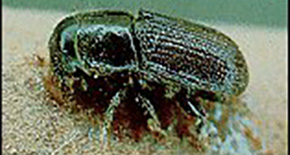Forester: Good Management Prevents Pine Bark Beetles
June 19, 2018
by Escambia County Forester Cathy Hardin
Pine bark beetles rarely affect healthy trees. Impacted trees generally have been stressed in one or more ways during the past year or two. Stressors can include drought, flooding, lightning, fire, wounds to the trunk or larger limbs, compaction of soil, poor soil, competition, etc.
 While there has been a slight upward trend in Southern Pine Beetle infestations in other parts of Florida, so far, the western panhandle has been spared. Southern Pine Beetles are potentially the most devastating of the southern pine bark beetles. In an outbreak, SPB can spread fast, killing many trees in a “spot” that gradually spreads outwards.
While there has been a slight upward trend in Southern Pine Beetle infestations in other parts of Florida, so far, the western panhandle has been spared. Southern Pine Beetles are potentially the most devastating of the southern pine bark beetles. In an outbreak, SPB can spread fast, killing many trees in a “spot” that gradually spreads outwards.
The best treatment for pine bark beetles is prevention through good forest management. To help combat one of the most economically devastating forest pests of the Southeast, the Florida Forest Service is accepting applications for the 2018 Southern Pine Beetle Assistance and Prevention Program from non-industrial, private forest landowners through June 29.
This program encourages sound management by providing incentive payments for landowners who conduct a first pulpwood thinning and offers partial cost reimbursement for activities such as prescribed burning, mechanical underbrush treatments and the planting of longleaf or slash pine rather than the loblolly pine, the beetle’s preferred species.
To obtain an application or to learn more about the Southern Pine Beetle Assistance and Prevention Program, visit FreshFromFlorida.com/SouthernPineBeetle/Prevention. Or contact the Escambia County Forester Cathy Hardin at (850) 587-5237.
Comments
2 Responses to “Forester: Good Management Prevents Pine Bark Beetles”



There are many things that can cause a spike in population as well as many predators, including other types of beetles and woodpeckers. There are currently programs to encourage the population of Red Cockaded Woodpeckers, but more for their own sake. Healthy ecosystems go through flux in population of all species, including these native beetles. Still the best treatment for bark beetles is prevention using some of the techniques above.
If there is an overpopulation of bark beetles, what if they breed and released woodpeckers in the forest(s) where there is an abundance of bark beetles (in big cities like New York they use Pergine Falcons to help control pigeon populations)?